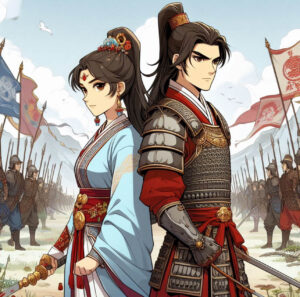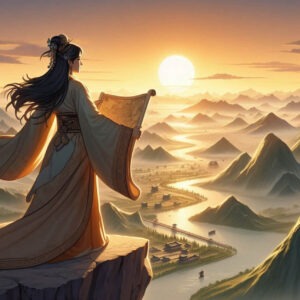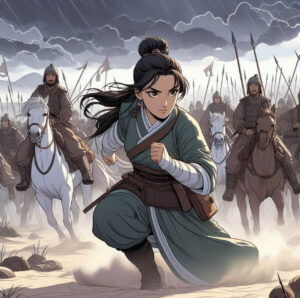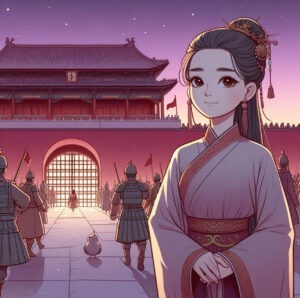Welcome Blessings!
(Tap 🔽 to see more topics!)


The best leaders don’t create followers… they create more leaders. This quote perfectly captures what makes a truly impactful leader, and it’s precisely what resonated with me after watching the magnetic series The Long Ballad. I just had to share my thoughts! The epic tale, filled with compelling characters and intense drama, will grab you. But beyond the captivating storyline, one thing stuck with me: the incredible leadership of the main character, Li Changge.
Her journey isn’t just entertaining. It’s packed with real-world lessons that can help us all, whether leading a big project, working with a team, or simply trying to improve ourselves. Li Changge’s strategic mind and her leadership growth offer some thrilling wisdom.
In this quest, I want to unpack 5 key leadership approaches relevant to anyone in a leadership role that we can learn from Li Changge in The Long Ballad. Watching her go from someone driven by revenge to a leader known for her wisdom, strategy, and empathy is truly inspiring. Let’s jump into these helpful lessons because they’re not just for commanding armies but also for leading effectively in our everyday lives.
You can’t just look at what’s in front of you. You’ve got to see what could be. That mindset is what made Li Changge’s leadership in The Long Ballad so compelling. At first, understandably, she’s laser-focused on getting even after everything she lost. But as the story progresses, you see her realize that revenge alone isn’t the answer for her or the people she cares about. She needs a clear vision, a path to lasting peace, and a better tomorrow.

What this tells us about leadership:
Think about someone who starts a company to make a quick buck and build something meaningful that lasts and changes how we live. Li Changge’s evolution from seeking revenge to striving for the greater good is a powerful illustration of this visionary leadership.
A Leader Who Looked Ahead:
Think about Nelson Mandela. He went through so much fighting against apartheid in South Africa. Even after being imprisoned for years, his focus wasn’t just on ending the injustice of the moment. He envisioned a future where all South Africans could live together peacefully, regardless of race. His long-term goal of unity and reconciliation, even after all he endured, shows a leader looking far beyond the immediate conflict to build a better future for his country. This ability to see and strive for a greater good, even after immense personal hardship, echoes Li Changge’s journey.
You can go fast alone, but you can go further together. That old saying rings true when you look at how Li Changge operated in The Long Ballad. She wasn’t afraid to join forces, even if it meant working with people who were, shall we say, complicated!
One of the most incredible things about her leadership was how she steered tricky situations by making innovative alliances. Think about her relationship with Ashile Sun. It started pretty uncertain but grew into this super strong partnership. She didn’t let her personal feelings get in the way of teaming up with people who could help her reach her bigger goals.
What we can learn about working with others:
It’s like everyday life. Sometimes, you must collaborate with friends or colleagues to venture into a big project. Li Changge understood this on a grand scale!
Real-World Example:
A good example was when Apple and IBM, big rivals in the day, decided to partner up in the early 2010s. They realized that by combining what they were good at, they could reach business customers in a way neither could do alone. By collaborating, they created new opportunities that wouldn’t have existed otherwise. That’s the power of innovative alliances, just like the ones Li Changge forged!
It’s about telling people what to do and understanding where they’re coming from. That’s what shines through with Li Changge in this, TV series The Long Ballad. You see that she doesn’t just rely on being tough or having authority. Instead, she tries to understand what others are feeling, what they’re scared of, and what motivates them. Her leadership is built on this ability to empathize, and it’s how she earns trust and loyalty, even from people who were initially against her.
Li Changge had a knack for reading people. She could make them feel seen and understood, and that’s how she inspired them to do great things together. This made her more than just someone calling the shots. She was a genuinely inspirational leader.
What we can learn about connecting with people:
Who would you rather follow? Someone who barks orders or someone who understands your concerns?
Real-World Example:
Consider Satya Nadella, the CEO of Microsoft. He’s known for changing the company’s culture by focusing on empathy. He tries to understand what his employees need and encourages a growth mindset. Under his leadership, Microsoft has become much more about teamwork and open communication, a significant shift from how things used to be. He’s a great example of how leading with emotional intelligence can transform an organization, much like Li Changge’s empathy helped her connect with and inspire those around her.
Life throws curveballs, and the best leaders know how to swing. That’s totally her. She constantly had to change her plans depending on what was happening around her, whether politics or battles. Early on, she was all about getting revenge, but as time passed, she realized her real strength was in switching up her approach when things changed.

What we can learn about being flexible:
Sometimes, your initial weekend plan gets derailed, but you must devise a new way to have a good time! Li Changge did this on a much bigger scale.
Real-World Example:
Remember when Netflix used to mail out DVDs? That was their main thing! But then they saw that everyone was starting to watch things online, so they switched to streaming. Reed Hastings, the CEO, boldly moved to adapt to the new technology, even though their DVD rental business was doing well then. That change is what allowed Netflix to become the giant it is today. It’s a perfect example of how being able to change your strategy can lead to massive success.
Sometimes, doing what’s best for everyone means you must give up something yourself. That’s a harsh truth, but it shines through in Li Changge’s journey. Throughout the series, she constantly faces these tough choices where she has to put what’s suitable for everyone else ahead of what she might want. Sometimes, that meant giving up her happiness and comfort or even putting herself in danger for the sake of her people. That kind of selflessness makes her go from someone seeking revenge to a leader you admire.
What this shows us about leadership:
It’s like when a team leader takes on extra work so the rest of the team can meet a deadline, even if it means a late night for them. Li Changge operated on a much larger scale but with the same principle.
Real-World Example:
Think about Mahatma Gandhi leading India’s fight for independence. He gave up much personal comfort and even his safety for the well-being of the Indian people. His decisions weren’t always popular then but were rooted in his deep commitment to freedom and equality for all. That willingness to sacrifice personally for a larger cause is a powerful example of leadership in action, as we see with Li Changge.
The Long Ballad is a historical Chinese drama during the Tang Dynasty. It follows the journey of Li Changge (played by Dilraba Dilmurat), a princess whose family is killed in a power struggle. The plot revolves around her quest for revenge, transformation into a strategic leader, and eventual rise to power. The series is filled with action, intrigue, complex characters, and emotional depth as Li Changge steers a turbulent world of politics, betrayal, and love.
The main characters in The Long Ballad are:
These characters, among others, contribute to the layered storytelling that makes The Long Ballad so compelling.
While Historical events from the Tang Dynasty inspire the Long Ballad, it is not a direct retelling of historical facts. The series incorporates fictional elements and characters, blending historical moments with imaginative storytelling. The real-life backdrop of the Tang Dynasty, including the reign of the Emperor, serves as the foundation for the drama. Still, much of the plot and character development is fictionalized for dramatic effect.
Li Changge’s romantic journey is complicated and filled with emotional tension. Throughout the series, she shares a close bond with Ashile Sun, and their relationship develops from political allies to something more profound. While the show keeps viewers on edge with its chemistry and complicated dynamic, the ultimate direction of Li Changge’s love life is left open-ended in the series. Her journey concerns personal growth, leadership, and self-realization, with romantic relationships secondary to her development.
The Long Ballad has 49 episodes in total. The series was initially broadcast in 2021 and quickly became popular due to its compelling storytelling, historical setting, and strong performances. Each episode lasts 45-50 minutes, and the series offers a blend of action, drama, and romance that keeps viewers hooked until the end.
The series has garnered a large following for several reasons:
While real historical events inspire the Long Ballad, it takes creative liberties with the storyline, characters, and certain events for dramatic purposes. The Tang Dynasty and its prominent figures, such as Emperor Taizong, are portrayed, but many characters and plotlines, including Li Changge’s personal story, are fictionalized. Viewers should approach the series as a historical drama, not a documentary.
Some of the major themes in The Long Ballad include:
If you enjoy historical dramas filled with action, romance, and political intrigue, then The Long Ballad is worth watching. With its strong performances, engaging plot, and well-developed characters, the series offers a captivating experience. The strong character arc of Li Changge, in particular, is a highlight that will leave you thinking long after the final episode.

When the credits roll on The Long Ballad, you realize it’s not just an epic tale of battles and kingdoms. It’s really about someone finding their way. Li Changge’s journey shows us that being a true leader isn’t about bossing people around. But it’s about clearly why you’re doing what you’re doing, caring about the people around you, and always trying to get better.
Whether you’re leading a project at work, helping out with a community group, or guiding your own life, Li Changge’s story is an excellent reminder that the most powerful way to lead isn’t to tell people what to do but to inspire them. So, what leadership qualities from stories or real life resonate most with you? Voila! Until next time!